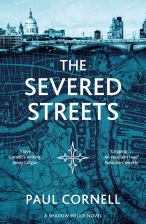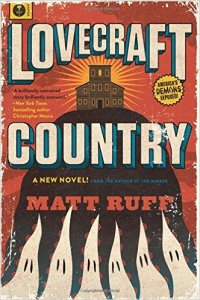(This is probably the quickest update to this blog in, like, ever, man. It’s not going to be a habit…)

I’ve been recently reading, whenever I needed to read something that felt less taxing than, say, Teju Cole’s boring Open City, one of the many, many urban fantasy novels that have appeared over the last two decades or so. I guess that much of it started with Jim Butcher’s Dresden Files series (it’s almost always series): books in which a Chicago private investigator-slash-wizard named Harry Dresden solves the problems left in their wake by various supernatural forces, all of which are arrayed as something like a substratum of our “real” reality, an entire alternative society of various kinds of vampires and fairies, assorted monsters, wizards, obviously, and other kinds of magical and supernatural beings.
There’s numerous such series out there, and I’ve read only a few of them: Ben Aaronvitch’s PC Peter Grant series, in which a magically-abled London police constable discovers the unreality of his own city; Richard Kadrey’s Sandman Slim series, set in Los Angeles (and Hell); Charles Stross’s Lovecraft-inflected Laundry Files, about a supersecret British supernatural spy agency defending Britain from the apocalypse that lurks just around the corner; and Paul Cornell’s Shadow Police series, in which a less magically-enabled London police unit finds itself faced with the unreality of their own London (it’s very frequently London!). And we might also include David Wong’s trilogy of novels, starting with John Dies at the End, here, even though it’s less centered on an urban agglomeration.
 There are echoes here of China Miéville’s Kraken, Neil Gaiman’s late-90s novel Neverwhere, of course, and no doubt also echoes of other, older fictions, such as C.S. Lewis’s Narnia series, which, after all, can be reached by stepping through a pretty mundane wardrobe. Yet, for the purposes of this post, which after all aren’t wholly scholarly, I’m going to suggest two things: first, that this has become a more commonplace motive than the mere proliferation of any kind of fantasy would suggest. That is to say, we might be inclined to say that given the increase in the volume of fantasy writing since Lewis, or indeed Gaiman, this might just be a reasonably simply expansion of the subset of fantasy that is concerned with urban magic, but that’s not what I think is happening. And second, it’s a shift in the focus of fantasy that is symptomatic: it bespeaks something about our relationship to the world, it suggests a broader desire to identify things beyond, beneath, besides mundane reality, not as a (negatively connoted) means of escape, but rather as a symbolic resolution of the contradictions of the contemporary cultural moment.
There are echoes here of China Miéville’s Kraken, Neil Gaiman’s late-90s novel Neverwhere, of course, and no doubt also echoes of other, older fictions, such as C.S. Lewis’s Narnia series, which, after all, can be reached by stepping through a pretty mundane wardrobe. Yet, for the purposes of this post, which after all aren’t wholly scholarly, I’m going to suggest two things: first, that this has become a more commonplace motive than the mere proliferation of any kind of fantasy would suggest. That is to say, we might be inclined to say that given the increase in the volume of fantasy writing since Lewis, or indeed Gaiman, this might just be a reasonably simply expansion of the subset of fantasy that is concerned with urban magic, but that’s not what I think is happening. And second, it’s a shift in the focus of fantasy that is symptomatic: it bespeaks something about our relationship to the world, it suggests a broader desire to identify things beyond, beneath, besides mundane reality, not as a (negatively connoted) means of escape, but rather as a symbolic resolution of the contradictions of the contemporary cultural moment.

I put this here because this isn’t a very well argued point yet, but one which I stumble over every time I read one of those books. But it seems to me that there is a reasonable claim to be made here for a symptomatic reading of urban fantasy. In such a reading, we might see the central trope at work in all of these novels, namely the existence of a largely hidden, non-mundane, magical, but also frequently threatening world very frequently described as “below” or “beneath” the surface reality of our (non-fictional) everyday lives as a means of working through and counteracting a generalized sense of a restricted space of action in the “real;” or, conversely (and this is one of the hitches I keep hitting), a means of expressing the limited scope of action in the real world through recourse to restrictions originating outside it, inaccessible to most of us, left to the manipulations of a (here, magical) elite. This “elite” status is not encoded here on a class basis, of course: David Wong’s slacker, dead-beat twentysomething heroes, who are able to see and actively work against the supernatural threats they encounter thanks to having imbibed a mysterious black substance they call the Soy Sauce, are pretty much par for the course here. Jim Butcher’s Harry Dresden is perpetually strapped for cash; the policemen of Aaronovitch and Cornell’s series are just that, regularly employed police officers, and Charles Stross’s secret agents likewise are simply public servants themselves.
Each of these cases would probably warrant closer exploration as to its politics, and I’ll work through two examples very briefly here. In Charles Stross’s series, the initially somewhat uncomplicated way in which the security state is expanded to include a (unsupervised, non-democratically legitimized) agency charged with supernatural defenses, in which this supernatural security state is implicitly championed in its attempts to defend humanity, is later broken by the recognition that this apparatus itself has increasingly become autonomous of regulating forces, increasingly fights for its own survival more than that of its charges. The series’ recognition that the bureaucratic apparatus, no matter its ostensible public service, will easily mutate into an almost entirely self-serving entity without any kind of public, democratic supervision, also suggests that urban fantasy is ill-read as always a (negatively) escapist form of fantasy.
In Paul Cornell’s Shadow Police (spoilers ahead, skip the paragraph if you’d rather not know), we discover in volume three that an earlier supernatural police force of sorts, the Continuing Projects Team, failed five years earlier and was wiped out by the evil that is now encroaching upon London. The twist: the CPT consisted, and had consisted for some time, of five representatives of the upper echelons of British society: knighted architects, successful film producers, well-heeled barristers, a senior civil servant, the chaplain of King’s College. As one of the new team of cops—two of them black, one gay, one the daughter of a criminal—notes, this earlier group was amateurish: a nod, and a decidedly negative one, to the upper class genteel amateurism beloved of much British genre fiction, at least. What’s important here, I think, is the way the representatives of the upper class fail to stop the encroaching danger, fail to uphold to already tenuous balance of the world, and end up replaced by a group recruited from a different social stratum, now tasked with picking up the pieces.
It’s not, obviously, that urban fantasy has recently replaced the more traditional sword-and-sorcery, neither broadly nor in the upper levels of recognition—it’s really only necessary to mention G.R.R. Martin’s Song of Ice and Fire, or Joe Abercrombie’s First Law series—but rather that it’s an interesting bell weather of sorts, one which may permit us insights into the way, more generally, we see genre fiction work through the central issues of the contemporary moment. And this may bear more working on, or not—we’ll see. But with the zombie book done, maybe I’ve got some spare time?

 Matt Ruff’s newest novel, Lovecraft Country, is a return to the form which I think he lost sometime after Sewer, Gas, Electric. Now, it’s bad form to begin a review by complaining about an author’s previous novels, but I found especially The Mirage a disappointing book. It’s a fantastic alternate history novel that ultimately declines its alterity in favor of assuming something fundamental, Platonic, about the nature of individual human beings—if you are a bad person in this reality, you will be a bad person in that alternative. I’ve written a bit about this
Matt Ruff’s newest novel, Lovecraft Country, is a return to the form which I think he lost sometime after Sewer, Gas, Electric. Now, it’s bad form to begin a review by complaining about an author’s previous novels, but I found especially The Mirage a disappointing book. It’s a fantastic alternate history novel that ultimately declines its alterity in favor of assuming something fundamental, Platonic, about the nature of individual human beings—if you are a bad person in this reality, you will be a bad person in that alternative. I’ve written a bit about this  I’ve been writing on this book for a while now for my second book project, and the more I think about it, the more I am impressed by it—which is why this post. I know this was once supposed to be a theory blog (and I’ll say something on Slajov
I’ve been writing on this book for a while now for my second book project, and the more I think about it, the more I am impressed by it—which is why this post. I know this was once supposed to be a theory blog (and I’ll say something on Slajov